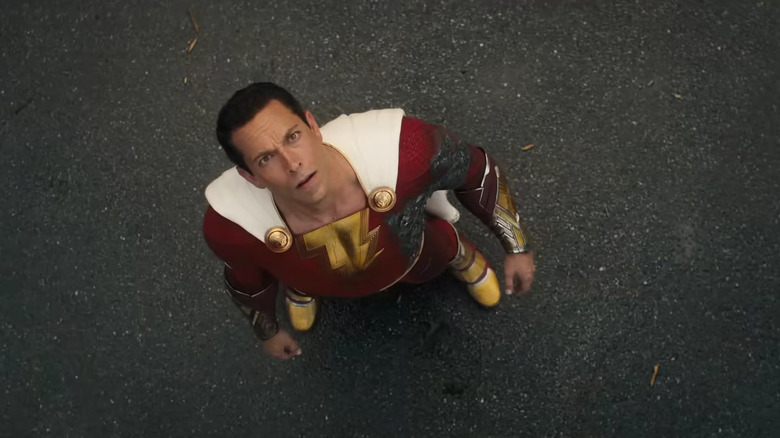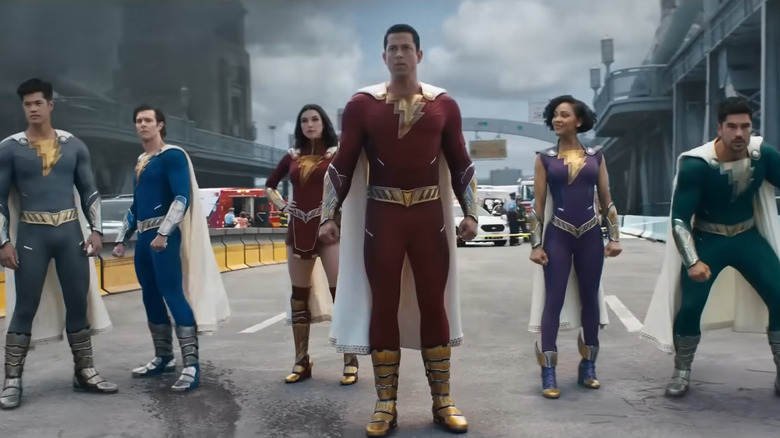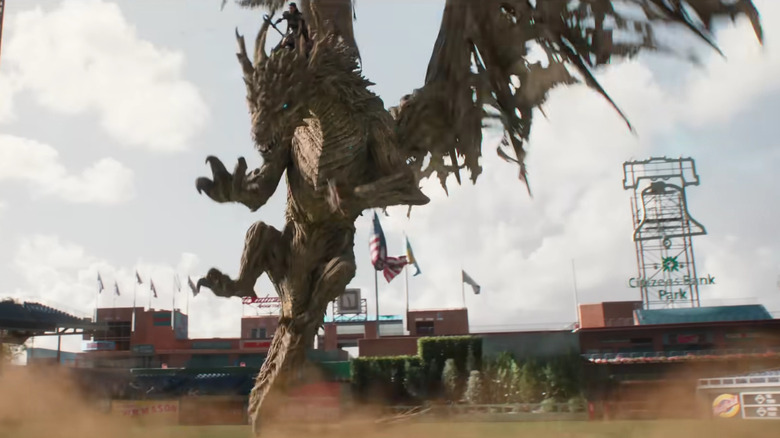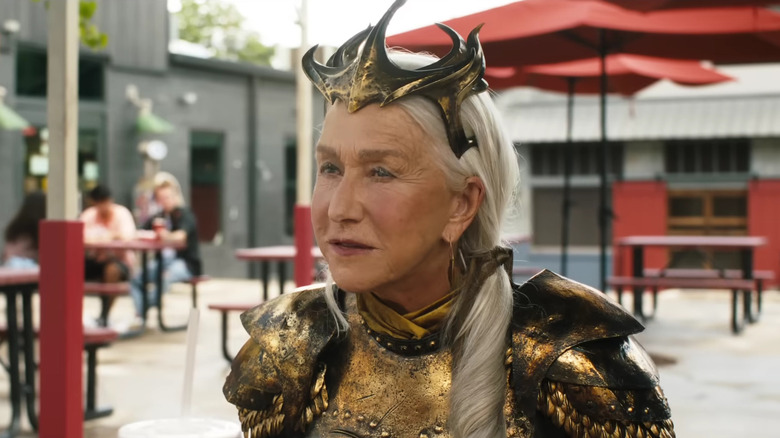Shazam! Fury Of The Gods Writers On Crafting Action Scenes And The Film's Prequel Comic [Exclusive Interview]
It feels like forever since 2019's "Shazam!" came out. Covid delays kept "Shazam! Fury of the Gods" from being released until later this month, but our favorite kid in a superhero's body is finally (almost) back. The film once again stars Zachary Levi as Billy Batson aka Shazam, who fights crime with his foster brothers and sisters.
This time around, the Shazamily is facing off against goddesses in the form of the daughters of Atlas — Hespera (Helen Mirren), Kalypso (Lucy Liu), and Anthea (Rachel Zegler) — who are looking for a dangerous artifact that could destroy the world. The kids are also trying to grow up and find their own ways while remaining attached to the people that love them. That's a lot to deal with for a bunch of people who aren't legally old enough to drink.
I recently spoke to writers Henry Gayden and Chris Morgan about the film, how they put action on a page, the movie's comic book prequel, and why the public in the film isn't appreciative of the Shazamily.
Note: This interview has been lightly edited for clarity and brevity.
'We really blue-skied the story'
This film's been in the works for a long time with Covid pauses and shifting around with everything. Did the delays change anything that you had written?
Gayden: No. There was one major thing that we lost, which was the opening of the movie was set in the stadium for the Phillies. They were actually at a baseball game, and then Covid restrictions happened and they were like, "Nope, we can't do that." So they're like, "Why don't we watch it on TV, guys?" That was their one big change. Also production, I'm sure that was a big money-save, too. That was really the only change creatively.
Are there any comic runs that inspired the story?
Gayden: There was a lot of reading and developing, and we did go down a lot of avenues of comic runs that exist. At the end of the day, we really blue-skied the story and felt that it was the best continuation of the Shazam story — and Billy, in particular.
How closely did you guys work with David in terms of what you were going to do or storylines that you were working on?
Gayden: I mean, David was, from the very beginning, always in every meeting, read every draft; he was very intimately involved in everything, developing the creatures ... you want to speak to this?
Morgan: I came on later in the process, and you had already been developing with David. But he is, at least from my experience with him, incredibly collaborative, very clever, very thoughtful about where you're going to use visual effects and not, and really making sure that actually, the character story is the thing that comes through. That's why people are showing up. It's one thing to have things exploding on the screen, but the reason why you remember it is the heartfelt learned lessons and changes that characters undergo and go through that are the core of this film.
The poor superheroes don't get a lot of love for their work at the beginning of the film. I know there were newspaper articles printed around on screen, and that seems like something that would actually happen. Did you guys have a backstory for some of the things that actually went wrong with the Shazamily?
Gayden: Well, this sounds like a plug, but there's a comic that just hit shelves [on February 28, 2023] called "Shazamily Matters." I wrote a prequel that essentially answers your question directly, so go to your local comic store and find out. But there was a lot of stuff in developing the script where I built out all of their failures, and then we just shorthanded at the end because we had a lot of story to tell.
Morgan: It literally was one of my favorite things when I read the draft when Henry first sent it to me. It's like they are the heroes that Philadelphia does not deserve, and nor do they want, because they're teenagers messing things up. But man, for the audience, it's super fun. They'll learn. They'll get better.
'He's really there for the cameras and the girls'
I love the big battle scene on the bridge toward the beginning of the movie. It made me wonder about the script. You had a lot of characters to showcase, I'd love to know how you actually sit down to write a scene like this. Is all the action on the page, or does that come later?
Gayden: Generally, when I write the action scenes, it's all at once. For me, I always have a little special place in me that resonates with each of the characters in a specific way. It's just writing the character dynamics that were established in the first one, now in adult bodies, in the middle of action where they're clearly going to be screwing things up in this context in particular, and just having fun with how each character deals with it.
A good example would be Freddy [Jack Dylan Grazer as a kid, Adam Brody as an adult]. Now that he's a superhero, now that he's actually living his dream, he's showboating non-stop. So he's kind of there to save people and he's kind of there to do a good job, but he's really there for the cameras and the girls. It was really fun and came out pretty naturally. It wasn't a chore or difficult.
Morgan: It's actually one of the things I love about Henry is that we're very similar that way. A lot of writers, they handle action differently. Action is important to varying degrees to certain writers. You get a lot of writers who put down the classic 'The Indians attack the fort' and that's it, and you're going to be into a 10-page action sequence somewhere, but they'll figure it out down the road.
We don't operate like that. That is, at least for me, one of the things that, just as a fan of movies and having worked at a video store and big fan of action movies, that's literally the thing that I care so much about. So when you write action, it's just beat-for-beat, think about what character is doing what. You're basically painting a draft so that the other creatives can then do the hard work, which is taking it off a page and putting it into real life.
Gayden: Chris is speaking to something that he's done a lot in the "Fast and Furious" movies, which I unabashedly adore, which is when action comes out of character, however the fight goes down or whatever action is happening, it's memorable and it's fun and it really sticks to you. When it's just action that's been written by someone else and then you slot characters into it, you feel the anonymity of that, and so I think we never did that.
Morgan: No, there's nothing more boring than just characters throwing punches. If you don't put real, true character moments in the middle of it, you're not going to remember it. Anyway. A long diatribe on action. Sorry!
'Three sisters who had their future and their fortune stolen from them by humans, by the wizards'
David F. Sandberg told me that Helen Mirren was the reach goal for Hespera, but he assumed the production wouldn't get her. Did you guys actually write the character for her?
Morgan: No.
Gayden: No, we did not. No, we wrote the character just because we wrote the character, and then she was the first person we went to.
You guys get into some mythology here, which I absolutely love, with takes on the daughters of Atlas and the creatures. I'd love to know what it was about those characters and creatures in particular that worked as a threat for the Shazamily.
Morgan: Well, it just felt like, particularly with the daughters of Atlas, they're coming from a really interesting place that has analogs in Billy's story, which is they are these three sisters who had their future and their fortune stolen from them by humans, by the wizards. They saw their parents fleeing, they saw their powers taken, and they saw their world die. They've been waiting all this time to come back, and now there's an opportunity to, in their minds, not destroy, but rebuild their world and be the saviors of their world.
There's something really emotional about that, and you can justify a villain doing what they do when it comes from an emotionally rootable core. That's why we went that direction with them, and Atlas specifically, because Shazam has the stamina of Atlas, right?
Right! I know Billy is dealing with some PTSD, some imposter syndrome. Zach mentioned that in his interview with me yesterday. It was so nice to see that addressed. Did you guys do any particular research into the psychology of this?
Gayden: Oh, I'd love to answer this. Yes. That scene is almost word for word, with superhero terms, a session I had with my therapist two weeks before writing that scene. So that was the research. It was something that was built into this character and that I feel sometimes to this day. I think a lot of people do, even talking to David and other people, and so it was really, really fun to put into a character. Particularly Shazam, the most natural character as a superhero to have imposter syndrome.
"Shazam! Fury of the Gods" will hit theaters on March 17, 2023.



